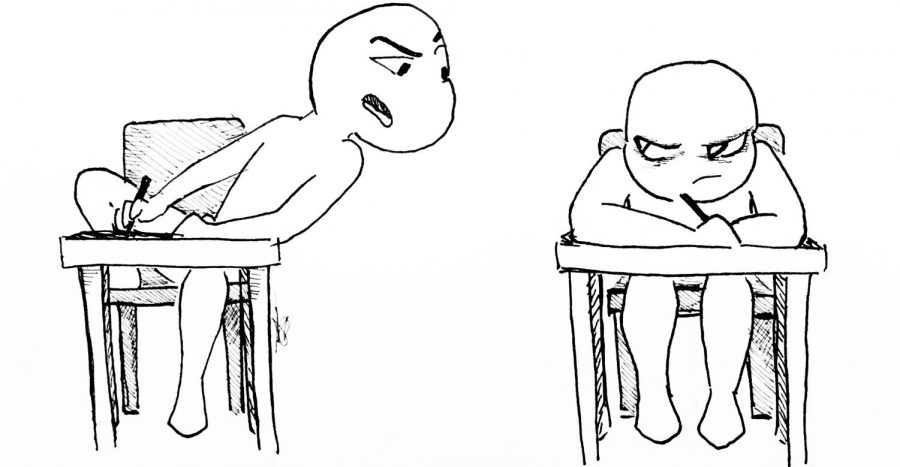Is it time to study… the implications of cheating
May 2, 2019
Kiki Hatch, formerly Kiki Henderson, a 2011 graduate of LBHS, recently emailed English teacher Jon Hendrickson about a time she cheated in his class during her senior year.
“At the end of my senior year, you assigned a paper on an old Star Wars movie. I can’t remember the specific reasoning surrounding my choice, but I used my older sister’s paper from a few years prior. Of course, I was busted and got a zero on the assignment (as I deserved). I have since kicked myself for that dumb decision all these years later. Not because I didn’t pass your class, because I did: but because I disrespected myself, disrespected you, and disrespected all the hard work I had done in high school up until that point,” Kiki shared.
Not only did Kiki apologize for her wrongdoing, but she also attached a replacement essay that she wrote eight years after the incident to make up for her plagiarism. This is a fantastic example of how cheating can affect you later on in life. Kiki has remembered her poor decision for all of her adult life and understands the importance of maintaining one’s integrity.
In a survey of 24,000 students by Rutgers University, over 95% of students said that they had participated in some cheating during school— ranging from copying homework to cheating on a test to committing plagiarism. This mass amount of students that cheat in school is astounding. Many students cheat daily with little risk of being detected by their teachers.
Despite teachers’ best efforts to help prepare their students for their tests and quizzes, many still cheat.
“I don’t see that many [students cheating], but it probably happens more than I know. I try to be a hawk and create a system wherein cheating should never be necessary or happen,” said Spanish teacher and foreign language department chair Jim Garvey.
On the Challenge Success survey taken by many students at LBHS, over 80% of students reported that they had cheated in some way in the past month. Most of the reported cheating was not on tests or quizzes but homework. This is one of the most common methods of cheating at LBHS.
“The number one way that I see many of my peers cheating is the copying of homework and the sharing of it through texts and other things,” said an anonymous freshman.
Social media has made the copying of homework even easier with messages that can disappear after you view them, so there is no trace that you sent or received the photo. The Challenge Success survey data reflects this trend, indicating that 68.7% of students admitted that they had copied homework in the past month.
When students are caught cheating in class, the consequences are as follows: On students’ first offense, they will be referred to the assistant principal, their parents will be notified, they will receive no credit for the assignment, and they will complete an Academic Integrity and Ethics assignment given by the assistant principal. Upon students’ second offense during their high school careers, the same protocol goes into effect. Also, the students will be removed from leadership roles, and the offenses will be reported to colleges the students apply to. If cheating happens in the same class twice, students can be dropped from the course. If the fraud occurs for the third time, the equal chances as the first two offenses and two cheating infractions will be shown on your high school transcript.
“The first offense is used as an opportunity to teach—the second time it is on you,” said assistant principal Mr. Bob Billinger.
Cheating in any way shows a lack of integrity and determination to study and work hard. It undermines other students who are studying and putting in the effort to get good grades. If you see someone else cheating in any way shape or form, do not hesitate to alert your teachers or assistant principals so that they can help the offenders understand the gravity of their actions. When students cheat, they are not only hurting themselves and their peers but also their teachers who work hard to teach their students the material and make sure they understand it.
If you are thinking about cheating, don’t. Go into SDL or lunch to talk with your teacher if you are not ready for the test or need more help; they will always be there to help you out.
As Kiki Hatch shares, “It is NOT worth it to try and cheat the system. The memory of what grade you got will fade away with time. BUT, the yuckiness of selling yourself and a cool teacher short does not.”
In a final piece of encouragement to this year’s graduating class, Kiki encourages, “You owe it to yourselves to finish strong.”






